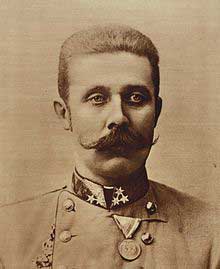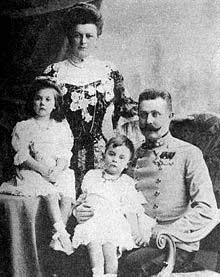
FGF E-Package
The Confederate Lawyer
September 12, 2011
World War I
Part I: The Beginning
by Charles G. Mills
fitzgerald griffin foundation
See World War I, Part II: The Consequences
 |
 |
The assassination of Archduke
Franz Ferdinand of Austria by the Belgrade Masonic Lodge |
|
GLEN COVE, NY — World War I was a disaster for Western civilization. Some countries won and some lost, but all paid a heavy price.
The war followed two generations of peace. Although the leaders of the great powers recognized that a war would bring horrors, they underestimated the nature and extent of those horrors. The English king, the German kaiser, and the Russian czar were cousins, but family ties did not guarantee peace.
In order to understand how one of the greatest wars in history broke out despite all the incentives for peace, one must understand the role of secret societies in starting the war. The largest of these societies was the Masons, a worldwide group of secret lodges under grand lodges or orients. Historically, they have opposed the power of both the Church and kings. This has not been true, however, in England, where the male members of the royal family traditionally have been Masons.
Throughout most of the twentieth century, the Masons in Mexico persecuted the Catholic Church through their control of the government. The Masons in France and Italy, as well as other secret societies, were involved in the anti-Catholic revolutions in these countries. Throughout World War I and for many years prior to it, the majority of the members of the French government were Masons.
Many Popes as well as the Southern Baptist Convention have condemned Masonry for excluding the sacrifice of Jesus Christ on the Cross from its theory of salvation. Although the Masons do believe in a supernatural creator, their philosophy is largely limited to the natural rather than the supernatural order. Indeed, they recognize no religious distinctions between Christians and pagans. Another religious objection is their practice of using veil oaths in violation of the Second Commandment.
Some Masons have engaged in serious crimes. The persecution of the Church in Mexico and the killing of Mexican priests, and the mass killings of priests, brothers, and nuns during the Spanish Civil war and the French Revolution all involved Masons. Most Masons are not involved in these intolerant and criminal activities; the Catholic Church has recognized this distinction a few times while consistently condemning the belief system of Masonry itself and prohibiting membership.
Masons, who were powerful in the early days of the United States, lost their power because of scandals. These included the 1826 ritual murder of William Morgan in upstate New York by members of the Batavia Lodge. The murder of Morgan was similar to the London murder of the banker Calvi by members of an Italian Propaganda Lodge of Masons in that the actual murderer in both cases was never identified. (In Italy, most Lodges of the Grand Orient are legal, but the Propaganda Lodges are illegal.)
A few decades after the Morgan murder, American Masons began rebuilding their power. Throughout the first two-thirds of the twentieth century, Masons were very powerful on the U.S. Supreme Court, holding eight of nine seats from 1948-1956. Presidents T. Roosevelt, Taft, Harding, F. Roosevelt, and Truman were Masons.
In the years leading up to 1914, there was a powerful Scottish Rite Masonic Lodge in Belgrade, which was the capital of the Kingdom of Serbia. At the same time, Austro-Hungarian Emperor Franz Josef was certain that the French Masons were trying to start a war between Austria-Hungary and Russia to destroy the great European monarchies. His suspicions were almost prophetic.
The immediate cause of World War I was the 1914 assassination of the Austrian Crown Prince Franz Ferdinand in Sarajevo by a Serbian. The assassin and his co-conspirators all carried military pistols. Many Serbians wanted a large national Slavic state in the Balkans. The Balkans are actually ill suited for such unity. The Croatians, Slovenes, and many of the Herzegonians are Western, Catholic, civilized, and were part of the Austro-Hungarian Empire. The Serbians, Montenegrins, and many of the Bosnians are Eastern Orthodox and brutal. At the end of the war, the King of Serbia got his kingdom of Yugoslavia with all the Balkans forced into it.
There is no doubt that the assassination of the Crown Prince was carried out by a secret society with help from high-ranking officers of the Serbian Army. Initially, suspicion fell on a group called National Defense, but this seems to have been unfounded. Historians are divided as to whether the assassination was planned by the Belgrade Masonic Lodge or a secret society known as the Black Hand. The Black Hand was organized secretly in the 1860s or 1870s and murdered the King of Serbia and his wife in 1903.
Many Serbian officers belonged to it. Perhaps the Masonic Lodge and the Black Hand were both involved. The fact that all the conspirators had military pistols may point to the Black Hand, but the testimony at the trial of the conspirators implicated the Masons. Historians who wrote during the war tended to believe it was the Masons; more modern historians lean more toward the Black Hand. The two groups probably had extensive overlapping memberships.
Austria conducted a thorough investigation. When it came to the inescapable conclusion that the Serbian government was involved, Austria issued an ultimatum that led to war. France, Britain, and Russia mobilized in preparation for a war against Austria, and almost certainly Germany.
Kaiser William II adored his army and general staff. His trust of his generals led him to make bad decisions himself and to allow the general staff to make bad decisions. France supported Serbia, so Germany decided to make war on France. The German generals and field marshals were too arrogant to realize what a propaganda defeat it was when the Germans attacked through the neutral countries of Belgium and Holland.
The Russians went to war for the sake of their fellow Eastern Orthodox in Serbia. The Italians, who had old grievances with Austria, were politically were more akin to the Masonic-dominated governments of Britain and France than to the authoritarian monarchies of Germany and Austria. The British were ready to come to the aid of France because of shared values, despite the history of enmity.
For over a generation, American foreign policy had been shifting to favor Britain, but America stayed out of the war until 1916. German heavy handedness -- including the sinking of the Lusitania, a ship carrying American tourists and munitions for Britain -- finally tipped the propaganda balance in favor of America entering the war. American participation never enjoyed anything like unanimous support.
In Part II of this series, I will discuss the far-reaching consequences of the war.
The Confederate Lawyer archives
The Confederate Lawyer column is copyright © 2011 by Charles G. Mills and the Fitzgerald Griffin Foundation, www.fgfBooks.com. All rights reserved.
Charles G. Mills is the Judge Advocate or general counsel for the New York State American Legion. He has forty years of experience in many trial and appellate courts and has published several articles about the law.
See his biographical sketch and additional columns here.
To sponsor the FGF E-Package, please send a tax-deductible donation to the:
Fitzgerald Griffin Foundation
344 Maple Avenue West, #281
Vienna, VA 22180
1-877-726-0058
publishing@fgfbooks.com
or donate online.
@ 2025 Fitzgerald Griffin Foundation